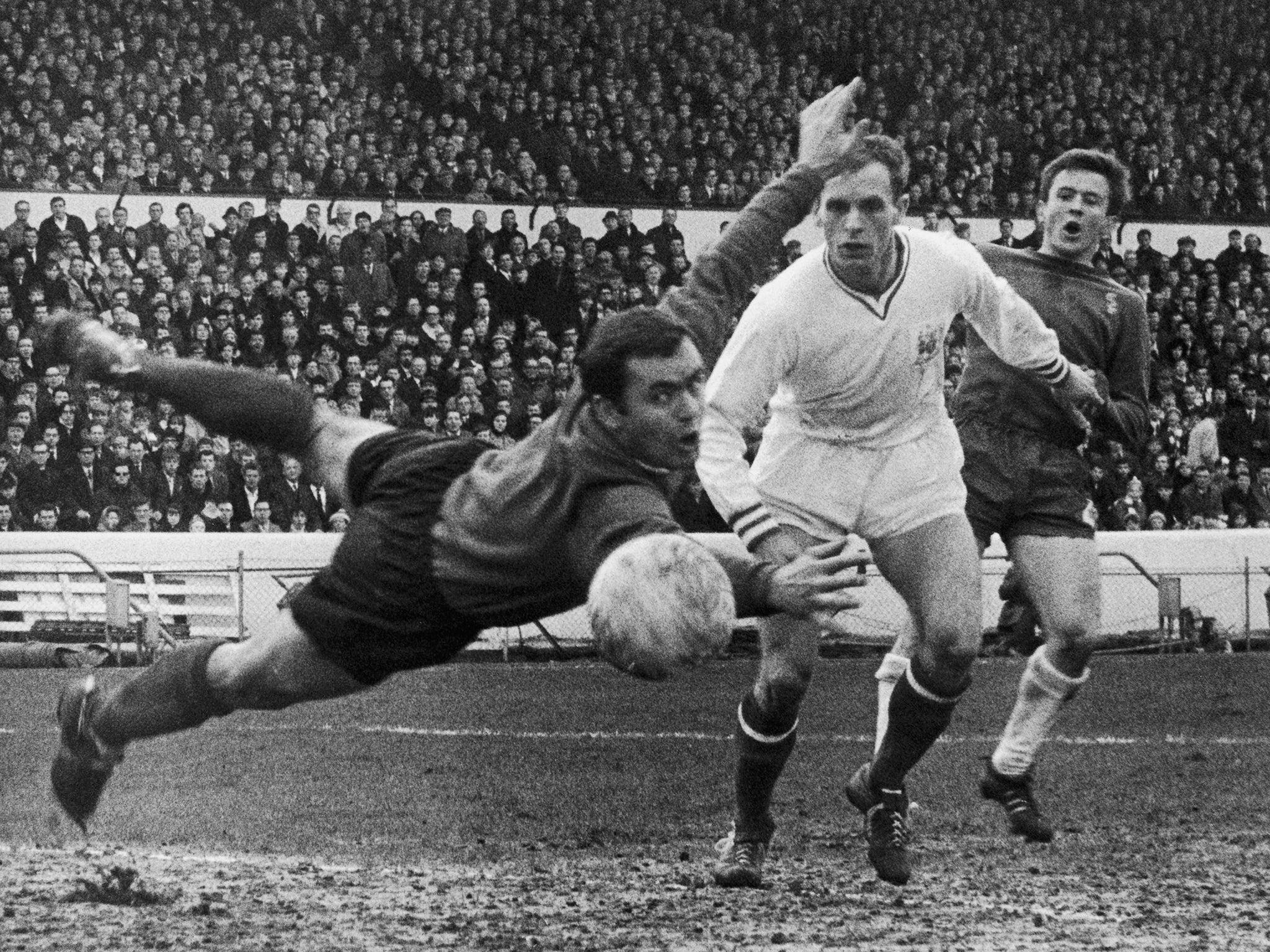Alan Hodgkinson: England footballer who set himself up as his sport’s first full-time professional goalkeeping coach
‘He’s the one,’ he told Alex Ferguson about Peter Schmeichel. ‘He’ll win the title for you’

Goalkeeping was the life’s work of Alan Hodgkinson. The superbly athletic, fiercely dedicated son of a Yorkshire coal miner stood between the posts for Sheffield United in some 675 games between 1953 and 1971, and collected five caps for England. Then he became the world’s first professional goalkeeping coach – innovative, ground-breaking work which stretched the time he made his living from the game to six decades.
Along the way he mentored Scotland’s net-goalkeepers in two World Cups and two European Championships and served many clubs, including Manchester United, for whom he played a central role in the recruitment of Peter Schmeichel from Danish football, telling Old Trafford manager Alex Ferguson: “He’s the one. He will win the title for you ... he’ll be the bargain of the century.”
As he grew up in the small town of Laughton Common, near Sheffield, Hodgkinson was encouraged by his family to become a concert pianist but, though he studied music, football became his obsession. After leaving school at 15 to work for the Co-op as a trainee butcher, he signed for the Midland League side Worksop Town, his agile and courageous displays soon alerting Sheffield United to his potential, and he turned professional at Bramall Lane as a 17-year-old in 1953.
Confidence in his own ability would later become a Hodgkinson hallmark, and he was essentially a hugely positive character, but at the time he was hesitant at making the commitment because he didn’t think he was good enough. The promise of a new suit helped him to decide, though he joked recently that he was still waiting for the outfit 60 years later.
Sturdily built but smaller than most keepers at 5ft 10in, Hodgkinson made rapid strides, aided by the selfless encouragement of United’s senior goalkeeper Ted Burgin, and he made his League debut in August 1954, cementing a regular place with the second-tier Blades during 1956-57. England under-23 honours soon followed and his meteoric ascent continued when he earned his first full cap as a 20-year-old in a 2-1 victory over Scotland at Wembley in April 1957.
At this point, with exceptional physical prowess underpinned by the sharp intelligence of his positional play and his computing of angles, Hodgkinson’s prospects seemed limitless, but although he did well enough on the international stage, and was included in the England squad for the 1958 World Cup finals in Sweden, soon he was supplanted, first by Bolton Wanderers’ Eddie Hopkinson and, more lastingly, by his friend Ron Springett of Sheffield Wednesday.
Back at club level, though, he thrived, shining as United rose to the top division as runners-up to Ipswich Town in 1960-61, the last line of defence in a miserly rearguard which also included full-backs Cec Coldwell and Graham Shaw and a half-back trio of Brian Richardson, Joe Shaw and Gerry Summers, a remarkably tight unit which played together largely unchanged for nearly seven seasons.
Though his last England outing was in 1960, he made the squad for the 1962 World Cup finals in Chile and remained consistently excellent for the Blades throughout the decade, being blameless for their relegation in 1967-68.
By the time he retired as a player, aged 35 in 1971, the need for, and absence of, specialist goalkeeping coaching had taken root in his mind. But before acting on that revolutionary notion he put in four years on the general coaching staff at Bramall Lane and an accomplished spell as assistant manager to Summers at Third Division Gillingham.
When the near-inevitable managerial fate of dismissal overtook him in 1981, Hodgkinson decided the time was ripe for his keeper-coaching initiative and he wrote to every senior English club offering his services.
Soon he was inundated with business and started as a part-timer for Coventry City, Watford and Manchester City, then became involved with England. Lauded everywhere he went by managers and players alike, he was recruited by Scotland in 1986, guiding a succession of keepers over 202 games and four major tournaments before concentrating on the club scene with which he had never lost touch.
His Manchester United association also commenced in 1986, the year Ferguson became boss, and his recommendation of the magnificent but previously untrumpeted Schmeichel was one of his proudest achievements.
Despite undergoing quadruple heart bypass surgery in 1992, Hodgkinson coached for many more clubs, notably Rangers, Everton, Aston Villa, Leicester City and Sheffield Wednesday, as well as devising and running courses for Uefa. Hodgkinson was awarded the MBE in 2008 for his services to the game, and when he finally stepped aside in 2012 – his last regular billet was with Oxford United – he was both the father and the master of his profession.
Alan Hodgkinson, footballer and coach: born Laughton Common, Yorkshire 16 August 1936; played for Sheffield United 1953-71; capped five times by England 1957-60; MBE 2008; married (two daughters, one son); died 8 December 2015.
Join our commenting forum
Join thought-provoking conversations, follow other Independent readers and see their replies
Comments